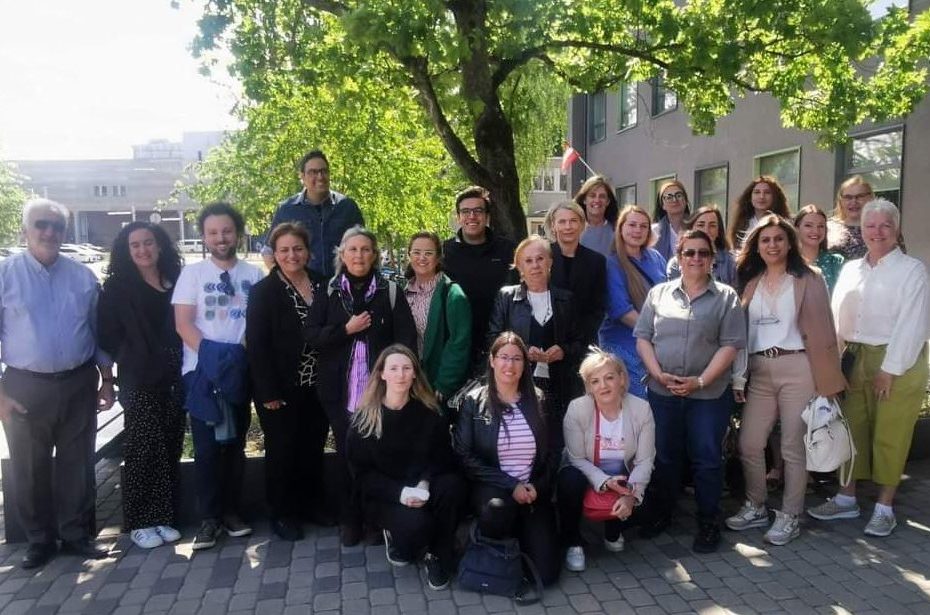From 30 May to 2 June, the 2nd Greenworal Meeting was held at the Riga Technical University, in the capital of Latvia, focusing on the mentoring part of the project, which is an Erasmus+ project for green entrepreneurship of women in rural areas.
Two parallel meetings were held, one for the coordination team and one for the training of mentors.
1) Project Coordination Team
The coordinating teams of the participating centres (from Cyprus, Ireland, Spain and Latvia) met to discuss various aspects of project monitoring, evaluation of progress, financial issues, etc.

On the first day we started with an update on the current status of the programme. Each of the participants made a report in which they talked about the number of modules that had been taught, the number of women enrolled in the programme, the type of modality that was being used when teaching the classes (face-to-face, blended, online or blended), the channels that had been used to attract potential students for the programme, the business ideas that were already emerging and also the difficulties that we had been encountering.
This was followed by a discussion on how the mentoring programme was developing. In the afternoon, that same day, the interim report was presented, in which the work to be delivered and administrative and financial matters were discussed. Finally, quality management was discussed and the channels through which the programme is being disseminated were described.
On the second and last day, an overview of the programme development was given, the next tasks to be carried out were assigned and deadlines were set.
We ended by talking about the next steps and of course thanking Zane, lecturer at the Technical University of Riga, and Zanda, the board of the Lidere association, for the warm welcome and for making us enjoy our stay there.

European coordination team of the Greenworal Project in Riga.
2) Mentor and Trainer Group
Karlis Valtiņš, Director of the International Programmes Unit at the University of Riga, welcomed us and led a sharing of mentoring experiences from Greenworal trainings in each country. We agreed that it was important to empathise with the participants and to differentiate the training according to each of them and the entrepreneurial idea, personal circumstances, development needs, etc.
Lateral thinking training
The mentors and trainers of the Project participated in the training ‘Lateral Thinking for creativity and elaboration of new ideas’, given by Professor Karine Oganisjana. We learned the theoretical part and also how to handle Eduardo de Bono’s 6 hats to generate different approaches to tackle problems and generate new ideas for entrepreneurship.

Testimonials from mentoring experiences in Latvia
These enriching testimonies came from three women with very different backgrounds, who shared their particular visions of their ventures based on the contexts of their own lives and the mentoring they had received or received.
-
-
Silva Jeromanova-Maura, member of the Association ‘LĪDERE’, we highlight her mentoring from Latvian schools.
-
Marika Ģederte, founder of the International College of Cosmetology, discovered the importance of connecting and empathising with the potential audience, in particular with the new generation of Centenials.
-
Ilze Garanča, founder of the baking company Caps, told us her moving story of reinventing herself after her separation as a mother and reorganising her life around family.
-

Visit to green ventures
-
- ‘Dabas Gardumi’ is a family-run organic farming company focused on red berry products (in Marupe, Latvia).


Pictures of the visit to the wild berry farm and the production of sweets from wild berries.
-
- ‘Dabas Laboratorija’: family-owned juice company (in Sigulda, Latvia).

-
- Rural entrepreneurship in wicker baskets using traditional and sustainable techniques near Riga, Latvia.

About Karine Oganisjana (source: http://muzizglitiba.gov.lv/labas-prakses-stasti/253)

Karine Oganisjana is an associate professor and leading researcher at the Faculty of Engineering, Economics and Management, Riga Technical University, as well as a board member of the Institute for Lifelong Education and Culture ‘VITAE’ and a lecturer. During her 31-year career as a teacher, Karine has worked at almost all levels of lifelong learning, from primary school to adult education. At the Technical University of Riga, she teaches pedagogy and research to local and foreign master’s and doctoral students, but outside she works actively with educators, teaching courses and classes, advising and helping to solve current pedagogical problems. She has based her work on several studies, in the framework of which methodologies and materials for the development of categories such as entrepreneurship, entrepreneurship, interdisciplinary learning, metacognition, thinking, social innovation, etc. have been researched and developed.

Learn about Erasmus plus, an initiative of the European Union.
The slogan of the Erasmus plus project is ‘Enriching lives, opening minds’.
The main objective is to connect people from different countries to foster an awareness of transnational unity through education, entrepreneurship and vocational training or sport.
‘Promoting the educational mobility of individuals and groups, both learners and staff, as well as cooperation, quality, inclusion and equity, excellence, creativity and innovation at organisational and policy level through lifelong learning, educational, professional and personal development of people in the fields of education and training, and personal development of individuals in the fields of education and training, youth and sport, within Europe and beyond, thereby contributing to sustainable growth, quality employment and social cohesion, as well as fostering innovation and strengthening European identity, active citizenship and participation in democratic life.
